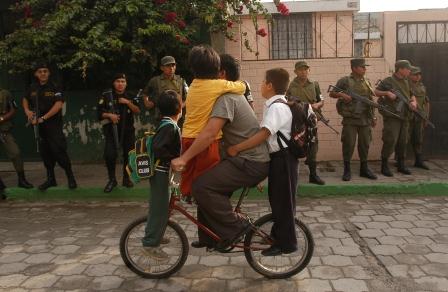Innovative policy recommendations for violence prevention

The Central American region is one of the most dangerous areas of the world. Reports of gangs and youth-related violence continue to make the headlines. Violence is endemic and seems to be deeply-rooted within the societies of Central America. Young people are particularly at risk as victims as well as perpetrators of violence. Governments often apply a repressive approach or an approach that exclusively targets security issues and does not analyze the main social dimension of violence. This approach has not been successful in addressing the issue of youth-related violence.
Highlighting this problem, two recent reports publish a series of policy recommendations to better address the structural and systemic causes of violence. Focusing on youth and women, the documents have been produced as part of the Initiative for Peacebuilding - Early Warning Analysis to Action. All reports emphasize the need for holistic policies to focus on dealing with the social causes of violence and to provide opportunities for people to break free from the cycle of violence.
Prevention of youth-related violence
One third of the population of El Salvador, Guatemala and Honduras is between 10 and 24 years old. Many young people live in an environment that provides limited opportunities for development and inadequate access to education, healthcare, culture and security. Young people – especially men – are also the main perpetrators and victims of violence. The first report therefore focuses on this often marginalized group. Nine Strategies to Prevent Youth Violence in Central America (PDF, English), argues that two points are critical for determining the success of an intervention. The quality of the activities to prevent young people from turning violent and becoming victims of violence is obviously crucial. But at the same time it is also critical at what point in a young person’s life the intervention happens.
To ensure the best result possible, the report advocates a three-tiered approach.
- Firstly, building an environment that is conducive to peace in everyday life (at home, at school, at work, in communities), and providing equal professional as well as recreational opportunities;
- Secondly, targeting more vulnerable groups and victims of violence to enable their social inclusion; and
- Thirdly, facilitating the reinsertion of people already caught up in violence by ensuring the criminal justice systems respect the law and human rights and providing them with opportunities for social reintegration.
Primary prevention policies refer to general social and economic development measures, secondary prevention strategies aim to improve the quality of life of vulnerable groups and tertiary prevention focuses on socialization and reintegration efforts.
These recommendations have been developed as part of Interpeace’s Central America Youth Programme and are based on the national policy recommendations that were produced for El Salvador, Guatemala and Honduras. The regionwide programme helps governments and civil society to address the issue of youth involvement in violence.
Women in street gangs
Street gangs are known to be overwhelmingly male-dominated groups. The second report, Violent Women and Violence Against Women (PDF, English), however, examines the role of women and girls in gangs of El Salvador, Guatemala and Honduras. It investigates why young women choose to join youth gangs. Surprisingly the women who participated in the study revealed that the roles of female gang members are changing. Women who once played marginal roles “have taken on a plethora of additional functions, [which] include hiding weapons, acting as drug mules and participating in extortion.”
The report issues policy recommendations to target the various factors of exclusion (dropping out from school, domestic violence and abuse, lack of recognition…), which tend to lead young women to join the gangs. It also recommends designing specific prevention and assistance programmes for young women, particularly in marginalised areas.
The research was conducted with the support of the International Development Research Center of Canada (IDRC) as part of the Initiative for Peacebuilding – Early Warning Analysis to Action (IfP-EW), financed by the European Union. Interpeace coordinated the cluster on youth, identity and security.
 |























